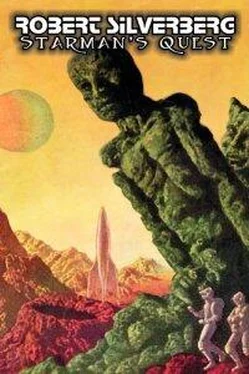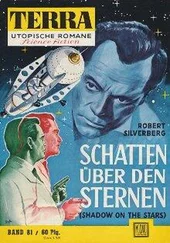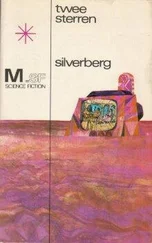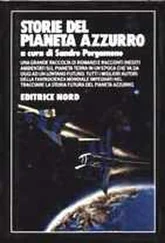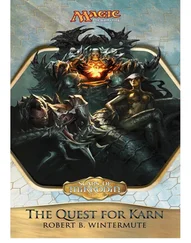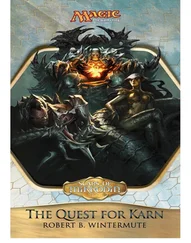Robert Silverberg - Starman's Quest
Здесь есть возможность читать онлайн «Robert Silverberg - Starman's Quest» весь текст электронной книги совершенно бесплатно (целиком полную версию без сокращений). В некоторых случаях можно слушать аудио, скачать через торрент в формате fb2 и присутствует краткое содержание. Год выпуска: 1958, Издательство: Gnome Press, Жанр: Фантастика и фэнтези, на английском языке. Описание произведения, (предисловие) а так же отзывы посетителей доступны на портале библиотеки ЛибКат.
- Название:Starman's Quest
- Автор:
- Издательство:Gnome Press
- Жанр:
- Год:1958
- ISBN:нет данных
- Рейтинг книги:3 / 5. Голосов: 1
-
Избранное:Добавить в избранное
- Отзывы:
-
Ваша оценка:
- 60
- 1
- 2
- 3
- 4
- 5
Starman's Quest: краткое содержание, описание и аннотация
Предлагаем к чтению аннотацию, описание, краткое содержание или предисловие (зависит от того, что написал сам автор книги «Starman's Quest»). Если вы не нашли необходимую информацию о книге — напишите в комментариях, мы постараемся отыскать её.
Starman's Quest — читать онлайн бесплатно полную книгу (весь текст) целиком
Ниже представлен текст книги, разбитый по страницам. Система сохранения места последней прочитанной страницы, позволяет с удобством читать онлайн бесплатно книгу «Starman's Quest», без необходимости каждый раз заново искать на чём Вы остановились. Поставьте закладку, и сможете в любой момент перейти на страницу, на которой закончили чтение.
Интервал:
Закладка:
Starman’s Quest
by Robert Silverberg
Author’s Preface
This was my second novel, which I wrote when I was 19, in my junior year at Columbia. I’ve written better ones since. But readers interested in the archaeology of a writing career will probably find much to explore here.
Robert Silverberg
17 May 2008
FOR BILL EDGERTON
1933–1956
Prologue
The Lexman Spacedrive was only the second most important theoretical accomplishment of the exciting years at the dawn of the Space Age, yet it changed all human history and forever altered the pattern of sociocultural development on Earth.
Yet it was only the second most important discovery.
The Cavour Hyperdrive unquestionably would have held first rank in any historical assessment, had the Cavour Hyperdrive ever reached practical use. The Lexman Spacedrive allows mankind to reach Alpha Centauri, the closest star with habitable planets, in approximately four and a half years. The Cavour Hyperdrive—if it ever really existed—would have brought Alpha C within virtual instantaneous access.
But James Hudson Cavour had been one of those tragic men whose personalities negate the value of their work. A solitary, cantankerous, opinionated individual—a crank, in short—he withdrew from humanity to develop the hyperspace drive, announcing at periodic intervals that he was approaching success.
A final enigmatic bulletin in the year 2570 indicated to some that Cavour had achieved his goal or was on the verge of achieving it; others, less sympathetic, interpreted his last message as a madman’s wild boast. It made little difference which interpretation was accepted. James Hudson Cavour was never heard from again.
A hard core of passionate believers insisted that he had developed a faster-than-light drive, that he had succeeded in giving mankind an instantaneous approach to the stars. But they, like Cavour himself, were laughed down, and the stars remained distant.
Distant—but not unreachable. The Lexman Spacedrive saw to that.
Lexman and his associates had developed their ionic drive in 2337, after decades of research. It permitted man to approach, but not to exceed, the theoretical limiting velocity of the universe: the speed of light.
Ships powered by the Lexman Spacedrive could travel at speeds just slightly less than the top velocity of 186,000 miles per second. For the first time, the stars were within man’s grasp.
The trip was slow. Even at such fantastic velocities as the Lexman Spacedrive allowed, it took nine years for a ship to reach even the nearest of stars, stop, and return; a distant star such as Bellatrix required a journey lasting two hundred fifteen years each way. But even this was an improvement over the relatively crude spacedrives then in use, which made a journey from Earth to Pluto last for many months and one to the stars almost unthinkable.
The Lexman Spacedrive worked many changes. It gave man the stars. It brought strange creatures to Earth, strange products, strange languages.
But one necessary factor was involved in slower-than-light interstellar travel, one which the Cavour drive would have averted: the Fitzgerald Contraction. Time aboard the great starships that lanced through the void was contracted; the nine-year trip to Alpha Centauri and back seemed to last only six weeks to the men on the ship, thanks to the strange mathematical effects of interstellar travel at high—but not infinite—speeds.
The results were curious, and in some cases tragic. A crew that had aged only six weeks would return to find that Earth had grown nine years older. Customs had changed; new slang words made language unintelligible.
The inevitable development was the rise of a guild of Spacers, men who spent their lives flashing between the suns of the universe and who had little or nothing to do with the planet-bound Earthers left behind. Spacer and Earther, held apart forever by the inexorable mathematics of the Fitzgerald Contraction, came to regard each other with a bitter sort of distaste.
The centuries passed—and the changes worked by the coming of the Lexman Spacedrive became more pronounced. Only a faster-than-light spacedrive could break down the ever-widening gulf between Earther and Spacer—and the faster-than-light drive remained as unattainable a dream as it had been in the days of James Hudson Cavour.
— Sociocultural Dynamics Leonid Hallman London, 3876Chapter One
THE sound of the morning alarm rang out, four loud hard clear gong-clangs, and all over the great starship Valhalla the men of the Crew rolled out of their bunks to begin another day. The great ship had travelled silently through the endless night of space while they slept, bringing them closer and closer to the mother world, Earth. The Valhalla was on the return leg of a journey to Alpha Centauri.
But one man aboard the starship had not waited for the morning alarm. For Alan Donnell the day had begun several hours before. Restless, unable to sleep, he had quietly slipped from his cabin in the fore section, where the unmarried Crewmen lived, and had headed forward to the main viewscreen, in order to stare at the green planet growing steadily larger just ahead.
He stood with his arms folded, a tall red-headed figure, long-legged, a little on the thin side. Today was his seventeenth birthday.
Alan adjusted the fine controls on the viewscreen and brought Earth into sharper focus. He tried to pick out the continents on the planet below, struggling to remember his old history lessons. Tutor Henrich would not be proud of him, he thought.
That’s South America down there , he decided, after rejecting the notion that it might be Africa. They had pretty much the same shape, and it was so hard to remember what Earth’s continents looked like when there were so many other worlds. But that’s South America. And so that’s North America just above it. The place where I was born.
Then the 0800 alarm went off, the four commanding gongs that Alan always heard as It’s! Time! Wake! Up! The starship began to stir into life. As Alan drew out his Tally and prepared to click off the start of a new day, he felt a strong hand firmly grasp his shoulder.
“Morning, son.”
Alan turned from the viewscreen. He saw the tall, gaunt figure of his father standing behind him. His father—and the Valhalla’s captain.
“Good rising, Captain.”
Captain Donnell eyed him curiously. “You’ve been up a while, Alan. I can tell. Is there something wrong?”
“Just not sleepy, that’s all,” Alan said.
“You look troubled about something.”
“No, Dad—I’m not,” he lied. To cover his confusion he turned his attention to the little plastic gadget he held in his hand—the Tally. He punched the stud; the register whirred and came to life.
He watched as the reading changed. The black-on-yellow dials slid forward from Year 16 Day 365 to Year 17 Day 1 .
As the numbers dropped into place his father said, “It’s your birthday, is it? Let it be a happy one!”
“Thanks, Dad. You know, it’ll feel fine to have a birthday on Earth!”
The Captain nodded. “It’s always good to come home, even if we’ll have to leave again soon. And this will be the first time you’ve celebrated your birthday on your native world in—three hundred years, Alan.”
Grinning, Alan thought, Three hundred? No, not really. Out loud he said, “You know that’s not right, Dad. Not three hundred years. Just seventeen.” He looked out at the slowly-spinning green globe of Earth.
Читать дальшеИнтервал:
Закладка:
Похожие книги на «Starman's Quest»
Представляем Вашему вниманию похожие книги на «Starman's Quest» списком для выбора. Мы отобрали схожую по названию и смыслу литературу в надежде предоставить читателям больше вариантов отыскать новые, интересные, ещё непрочитанные произведения.
Обсуждение, отзывы о книге «Starman's Quest» и просто собственные мнения читателей. Оставьте ваши комментарии, напишите, что Вы думаете о произведении, его смысле или главных героях. Укажите что конкретно понравилось, а что нет, и почему Вы так считаете.
